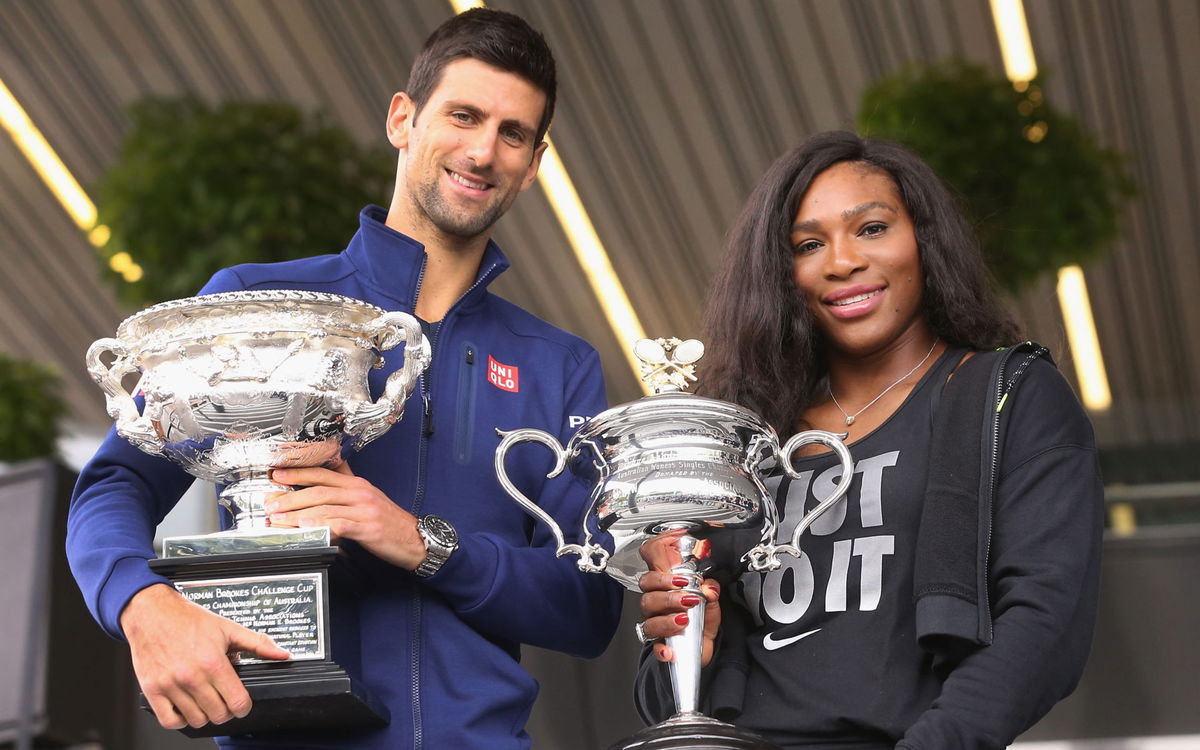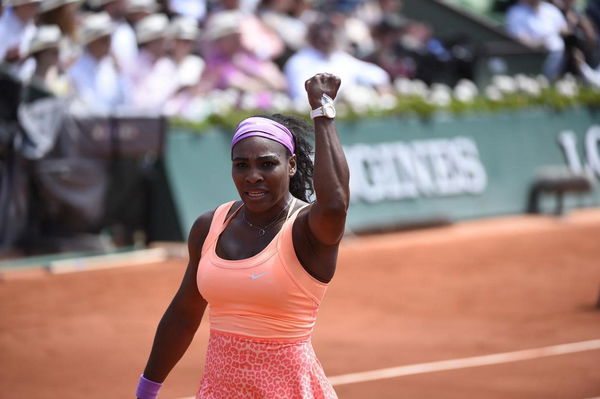May 1, 2025 | 9:21 AM EDT

Getty
MELBOURNE, AUSTRALIA – JANUARY 15: Serena Williams of the USA and Novak Djokovic of Serbia pose with the trophies during the 2016 Australian Open official draw at Melbourne Park on January 15, 2016 in Melbourne, Australia. (Photo by Michael Dodge/Getty Images)

Getty
MELBOURNE, AUSTRALIA – JANUARY 15: Serena Williams of the USA and Novak Djokovic of Serbia pose with the trophies during the 2016 Australian Open official draw at Melbourne Park on January 15, 2016 in Melbourne, Australia. (Photo by Michael Dodge/Getty Images)

Getty
MELBOURNE, AUSTRALIA – JANUARY 15: Serena Williams of the USA and Novak Djokovic of Serbia pose with the trophies during the 2016 Australian Open official draw at Melbourne Park on January 15, 2016 in Melbourne, Australia. (Photo by Michael Dodge/Getty Images)

Getty
MELBOURNE, AUSTRALIA – JANUARY 15: Serena Williams of the USA and Novak Djokovic of Serbia pose with the trophies during the 2016 Australian Open official draw at Melbourne Park on January 15, 2016 in Melbourne, Australia. (Photo by Michael Dodge/Getty Images)
“I want to thank me for always believing in me. I want to thank me for never quitting and always dealing with the pressure.” Teenage sensation Mirra Andreeva said, back in February, after her epic WTA 1000 triumph in Dubai. Emphasizing her newfound mental strength to take on any opponent and beat them, the Russian phenom reflected on her tough mindset. Perhaps that’s the reason she was able to outplay the likes of Elena Rybakina, Iga Swiatek, and then Aryna Sabalenka across Dubai and Indian Wells to clinch back-to-back 1000-level trophies – being just a 17-year-old. And guess what? That’s all it takes to actually distinguish ‘good’ and ‘great’ players, according to 23-time slam champion Serena Williams’ former coach. He believes it’s the mental state – more than any other attribute – that can make or break a player’s chances to become ‘great’. How?
Watch What’s Trending Now!
Patrick Mouratoglou, who has coached the likes of Serena, alongside Grigor Dimitrov, Stefanos Tsitsipas, and currently Naomi Osaka, had an interaction with the Tennis Channel, dated April 30. He was asked what really differentiates good from great athletes, based on his observation and experience with renowned WTA and ATP athletes. So what did he reveal? “I would say not so much in terms of tennis, not so much in terms of fitness level. Because a lot of guys and women tennis players are incredibly good technically, tactically, (and) physically. But for me, it’s the mental side.” Any specific reason?
Mouratoglou explained, “I think champions are just processing things differently. They’re never satisfied, they always want more. They have a huge, big perception of themselves in terms of how good they are, in terms of tennis players.”

He continued, “And I think it’s very important, and you see it in the young players. That’s how we can say very often, ‘This guy or this young lady is gonna be great’. Because you see that they believe in themselves much more than others. We saw it with Alcaraz when he started to make some results. They don’t fear anyone. They think they can beat anybody. We hear it when we are around those guys. We hear them talk.”
To make his point crystal clear on this aspect, he cited 24-time slam king Novak Djokovic‘s example. “You remember when Rafa (Rafael Nadal) and Roger (Federer) were winning absolutely everything, all the top 10 players were saying it’s impossible to win a slam with those two guys. Plus, there was Murray. So it felt impossible. And then a young 19-year-old came up and, I am talking about Novak, and he said, ‘I’m gonna beat those guys’. And he not only said it, but he made it because he believed in himself so much.”
Certainly he did. The champion mindset of Djokovic is probably the reason he’s been able to win 24 slams. It’s the most among the ATP icons, and tied with WTA legend Margaret Court’s 24 major trophies. While Mouratoglou mentioned Djokovic’s great mental strength, he’s also seen how Serena Williams possessed an unbeatable mentality. He saw it firsthand during his time as her coach. Especially at the 2015 Roland Garros, where she defied extreme pain and suffering to emerge victorious.
Patrick Mouratoglou recalls how Serena Williams overcame health obstacles to emerge as the champion
Patrick Mouratoglou had an interaction with actor Rainn Wilson on his Soul Boom podcast last month. While talking to him, Serena Williams‘ ex-trainer revealed the one special quality that distinguished her from other tennis icons. Being in awe of her unbeatable winning mindset, he cited an example from their time during the 2015 French Open.
During this edition, Williams was suffering from a 40°C fever – “the maximum you can have,” Mouratoglou mentioned. He added, “So she couldn’t leave the bed for the whole French Open. She stayed in bed. You have no idea she couldn’t even walk. She couldn’t walk. A few times, I told her, ‘Let’s go outside and walk at least for a few minutes. You cannot stay in bed all day.’ Couldn’t move. We did zero practice, zero warm-up before matches. So she was going straight from the bed to the stadium to play the match. She lost every first set because she was dead. But then the rage, the refusal to lose, came in, and she won.”
Later, he got to know about her dire situation post-matches. Other female players, who saw her afterwards in the locker room, informed him how she used to just lie down “for at least one hour on the floor after every match, crying.” Reason? “Because she gave more than what she had, and she won the French Open. This is impossible. But she did it.” In the summit clash, the American icon eventually beat Czechia’s Lucie Safarova to clinch the trophy with a score line of 6-3, 6-7 (2-7), 6-2.
Mouratoglou concluded, “That’s why I’m saying someone who believes in herself that much, who thinks that whatever circumstances, she’s going to win, this is incredible. This is incredible!”
Speaking of ‘good’ and ‘great’ players, Djokovic and Williams have both made it into the history of the sport. But who in the current generation holds that skill and determination? Do let us know in the comments below.



